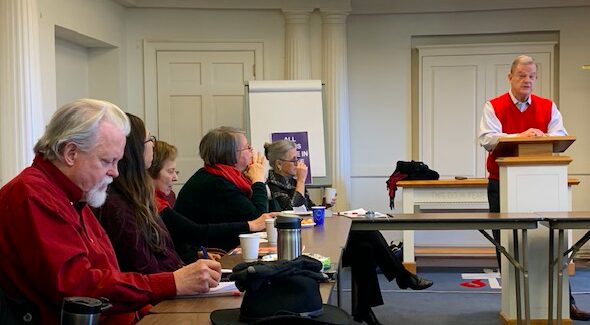
The Road to Jericho: Why Christians Advocate
THE ROAD TO JERICHO – WHY CHRISTIANS ADVOCATE
— By Phillip Church, Elder
Lewinsville Presbyterian Church, McLean VA
Luke 10:30 – There once was a man going down from Jerusalem to Jericho
when robbers attacked him, stripped him and beat him and left him half dead.
Most of us who are founded in the Christian faith will be familiar with the Apostle Luke’s account of the Parable of the Good Samaritan. It’s easy to recall the characters of the story: the man from Jerusalem, the robbers, the priest, the Levite and the Samaritan. The passage focuses largely on the Samaritan, the good neighbor, who rescues the man from Jerusalem who has been assaulted and left in a ditch beside the road to Jericho. The passage calls on all of us to be good Samaritans, good neighbors, to those in need whom we encounter by the side of the road in our life’s journey.
But there is another element to the Good Samaritan story that is worthy of reflection: That road to Jericho. That short 18-mile stretch of narrow pathway heading out from the northeast gate of Old Jerusalem and down to Jericho in the Dead Sea Valley below. Why was this road so dangerous? After all, it was so close to the mighty city of Jerusalem. Why weren’t there Roman or Israelite patrols along the road to discourage robbers? Was there no one advocating for a safer road?
Think, metaphorically, of the road to Jericho as the course of our life’s journeys. Instead of ancient robbers waiting behind boulders and trees ready to physically assault us and dispossess us of what we have, today’s robbers take on all sorts of subtle forms and disguises: predatory car title lenders, business owners who engage in wage theft by not paying employees for all the hours they’ve worked, titans of pharmaceutical firms who push addictive pills for a profit.
Of course, as Good Samaritans, we should be prepared to help those who have become modern-day victims of injustice. But we also have the opportunity to work for a safer road to travel through life. To work to reduce the number of fellow citizens who end up in that ditch beside the road, victimized by others.
We are fortunate to have the opportunity, capacity and skills not only to help those in need but also to advocate for changing what is causing so many to end up in the ditch. In fact, today there is a certain urgency that we advocate for change in the conditions that place so many in need of our charity. Consider:
• In today’s world, there are large and growing numbers of desperate and despondent people who often for no fault of their own find themselves in the ditch by the side of the road. We can try to be Good Samaritans to as many as possible, but the numbers far exceed our charitable capacities.
• Too many of our political leaders are failing to exercise their authority and duty to protect the most vulnerable by adopting regulations and enforcing laws to make that proverbial road to Jericho a safer place to travel. Unless we are diligent and active advocates, our political leaders and lawmakers, just like the biblical priests and Levites, will continue to ignore those in need.
So maybe, just maybe, in addition to being Good Samaritans, we should also become good advocates for changes in those conditions that have resulted in so many people ending up in the ditch. It’s also the right thing to do. Studies of today’s economic and social ills suggest that it is more cost-effective to prevent and prosecute those who would prey on others than the costly alternative of spending scarce resources on rescuing and rehabilitating their victims. Advocacy for better social legislation and stronger institutions can improve the chances that everyone is better equipped to travel safely and securely on their own road to Jericho.
Interestingly, in Luke’s account of the Parable of the Good Samaritan, Jesus is not speaking to his disciples. Jesus is responding to a question made by … yes, a “lawmaker.” The Parable begins:
Luke 10:25 – Just then a lawmaker stood up to test Jesus. “Teacher,” he said, “what must I do to inherit eternal life?” And Jesus replied….
The Parable of the Good Samaritan advocates for acts of Christian charity toward those in need. A subtler message behind the Parable is its call for us to advocate for those who have been or might become victimized. If we’re ever going to see that safer road to Jericho, we need to stand up and start talking more to lawmakers.
____________________________________________________________
Note: Phil Church shared this reflection at the Lewinsville Presbyterian Church in McLean, VA on Dec. 7, 2019, at a Faith and Public Policy breakfast. He introduced Kim Bobo, executive director of the Virginia Interfaith Center for Public Policy, who spoke that day to a group of 40 interfaith community members about VICPP’s legislative agenda for the 2020 General Assembly.
